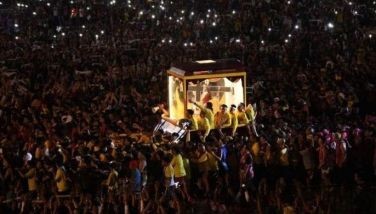New York Times editorial: US aid helping militants because of AFP corruption
October 19, 2003 | 12:00am
American aid to the Philippines has done Islamic militants more good than its intended beneficiary — the Philippine military — due to corruption, malpractices and questionable integrity of the Armed Forces of the Philippines (AFP), according to an editorial of the New York Times yesterday.
"American aid hasn’t improved the Philippine military so far, and in many ways it has benefited the Islamic militants it seeks to combat," the editorial column titled "A Fair Fight in the Philippines" by Brett M. Decker said.
The editorial, which comes at the heels of US President George W. Bush’s short visit to the country, recommended that the US cut off military aid to the Philippines and focus on providing economic support to "help develop the poor Muslim islands in the south."
"A significant share of the military budget is lost to graft," it said.
"Unless the integrity of arms transfers to the Philippine military can be guaranteed, which is not likely, the United States should consider cutting off military aid to the Philippines and replacing it with economic support to help develop the poor Muslim islands in the south," it said.
Bush has announced some $340 million in aid this year to the Philippines.
President Arroyo has sought to request additional assistance for the AFP.
"Withholding support from the Philippine brass sends the message that Washington -the nation’s most important ally -expects the military to keep its hands off the civilian institutions of government," the New York Times editorial said.
The Philippines has endured several coup attempts in the 1990s and recently last July when some 300 young military officers staged a mutiny expressing disgruntlement over the alleged corruption in the AFP.
The editorial noted the "alarming" admission of AFP chief Gen. Narciso Abaya in August about the widespread corruption in the Philippine military.
It pointed out how US aid to the AFP has been "siphoned away." It said that based on testimonies in Congress investigations in recent months, military-branded firearms from the US had been recovered in camps belonging to the Abu Sayyaf terrorist group and the separatist Moro Islamic Liberation Front (MILF).
"Assault rifles, grenade launchers and other American arms have been used by Muslim radicals against Philippine troops-the very troops United States funds are supposed to assist."
"Selling military hardware on the black market is another common practice. Recent raids of bases of the separatist MILF have turned up caches of arms with Philippine military markings," the New York Times editorial added.
"If Washington and Manila are serious about eliminating Abu Sayyaf, the United States Special Forces should be given the assignment," it said.
The New York Times said that while the presence of foreign troops in the Philippines would violate its Constitution, such move can still be justified.
"It does, however, allow the United States to come to the defense of the Philippines if the islands are attacked. Such an action can be justified in the present case because the terrorist groups get foreign money," it said.
"American aid hasn’t improved the Philippine military so far, and in many ways it has benefited the Islamic militants it seeks to combat," the editorial column titled "A Fair Fight in the Philippines" by Brett M. Decker said.
The editorial, which comes at the heels of US President George W. Bush’s short visit to the country, recommended that the US cut off military aid to the Philippines and focus on providing economic support to "help develop the poor Muslim islands in the south."
"A significant share of the military budget is lost to graft," it said.
"Unless the integrity of arms transfers to the Philippine military can be guaranteed, which is not likely, the United States should consider cutting off military aid to the Philippines and replacing it with economic support to help develop the poor Muslim islands in the south," it said.
Bush has announced some $340 million in aid this year to the Philippines.
President Arroyo has sought to request additional assistance for the AFP.
"Withholding support from the Philippine brass sends the message that Washington -the nation’s most important ally -expects the military to keep its hands off the civilian institutions of government," the New York Times editorial said.
The Philippines has endured several coup attempts in the 1990s and recently last July when some 300 young military officers staged a mutiny expressing disgruntlement over the alleged corruption in the AFP.
The editorial noted the "alarming" admission of AFP chief Gen. Narciso Abaya in August about the widespread corruption in the Philippine military.
It pointed out how US aid to the AFP has been "siphoned away." It said that based on testimonies in Congress investigations in recent months, military-branded firearms from the US had been recovered in camps belonging to the Abu Sayyaf terrorist group and the separatist Moro Islamic Liberation Front (MILF).
"Assault rifles, grenade launchers and other American arms have been used by Muslim radicals against Philippine troops-the very troops United States funds are supposed to assist."
"Selling military hardware on the black market is another common practice. Recent raids of bases of the separatist MILF have turned up caches of arms with Philippine military markings," the New York Times editorial added.
"If Washington and Manila are serious about eliminating Abu Sayyaf, the United States Special Forces should be given the assignment," it said.
The New York Times said that while the presence of foreign troops in the Philippines would violate its Constitution, such move can still be justified.
"It does, however, allow the United States to come to the defense of the Philippines if the islands are attacked. Such an action can be justified in the present case because the terrorist groups get foreign money," it said.
BrandSpace Articles
<
>
- Latest
- Trending
Trending
Latest
Trending
Latest
Recommended






























